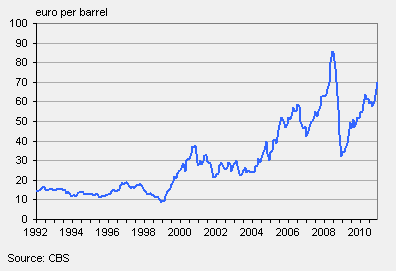Crude oil prices strongly affect terms of trade

Following the outbreak of the credit crisis in autumn 2008, Dutch terms of trade initially improved considerably. In the course of 2009, however, they started to deteriorate. This development was partly caused by oil prices, which have a considerable influence on import prices, and - with some delay - also on export prices.
Terms of trade

Export prices follow import prices
The Netherlands imports much more crude oil than it exports. A sudden decrease in crude oil prices will therefore have a positive effect on Dutch terms of trade in the short term. After a while, however, terms of trade tend to deteriorate. It takes some time before Dutch producers start to pass on the lower oil prices to their customers. Furthermore, prices of natural gas, of which the Netherlands exports more than it imports, tend to follow oil prices with some delay.
Export price and import price

Smaller effect of oil prices in the 1990s
Export prices have tended to follow import prices with some delay since the end of the 1990s. This pattern was not visible in the 1990s because of the relatively low oil prices at the time. From 1992 to 1998, the price for a barrel of North Sea Brent oil varied continuously between 10 and 20 euro. Oil prices have not been so low since then.
Because of the higher oil prices, the value of imports of crude oil as a percentage of total imports was much higher in the first decade of this century than in the 1990s. Thus, the “crude oil effect” on terms of trade has become more substantial. In spite of this, terms of trade were more favourable in the first ten years of this century than in the 1990s.
Oil price, North Sea Brent

Wouter Jonkers